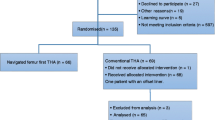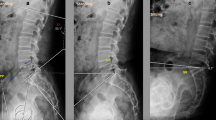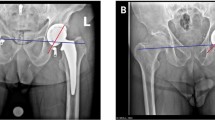Abstract
Introduction
Computer-assisted surgery (CAS) relying on registration of the anterior pelvic plane (APP) allows precise acetabular component placement. We determined the variability of cup placement in patients who underwent THA with and without the use of CAS that does not rely on the registration of APP.
Methods
Fifty-one patients who underwent staged-bilateral THAs, one without CAS (control), and a subsequent one with CAS (study group), were included. Acetabular inclination and anteversion were measured on standardized post-operative radiographs. Variance in cup position and Lewinnek’s zone proportionality were compared between the groups. Multiple regressions were performed to identify factors affecting variability in acetabular component placement.
Results
The mean inclination for the control and study group was 42.7° (SD 4.5) and 42.5° (SD 2.9), respectively. The inclination variance was 20.5° and 8.2° respectively (p = < 0.001). Cup inclination was more consistent in the study than in the control group (deviation from the mean: 2.3° vs. 3.8°, p < 0.001). The mean anteversion for the control and the study group was 25.5° (SD 7.4) and 26.8° (SD 4.3), respectively. The anteversion variance was 54.2° and 18.2° respectively (p = <0.001). Consistency in cup anteversion was significantly improved with CAS (deviation from the mean: 3.4° vs. 5.8°; p = 0.002). Lewinnek’s zone proportionality was not affected by the use of CAS. In the linear regression analysis, CAS significantly increased consistency in cup inclination (p = 0.01). Patient’s factors including BMI and laterality affected consistency of cup placement.
Conclusion
CAS without referencing the APP allows a more consistent orientation of the acetabular component when compared to freehand placement.



Similar content being viewed by others
References
Gonzalez Della Valle A, Padgett DE, Salvati EA (2005) Preoperative planning for primary total hip arthroplasty. J Am Acad Orthop Surg 13(7):455–462
Murphy WS, Yun HH, Hayden B, Kowal JH, Murphy SB (2018) The safe zone range for cup anteversion is narrower than for inclination in THA. Clin Orthop Relat Res 476(2):325–335
Kennedy JG, Rogers WB, Soffe KE, Sullivan RJ, Griffen DG, Sheehan LJ (1998) Effect of acetabular component orientation on recurrent dislocation, pelvic osteolysis, polyethylene wear, and component migration. J Arthroplast 13(5):530–534
Hassani H, Cherix S, Ek ET, Rüdiger HA (2014) Comparisons of preoperative three-dimensional planning and surgical reconstruction in primary cementless total hip arthroplasty. J Arthroplast 29(6):1273–1277
Lee YK, Biau DJ, Yoon BH, Kim TY, Ha YC, Koo KH (2014) Learning curve of acetabular cup positioning in total hip arthroplasty using a cumulative summation test for learning curve (LC-CUSUM). J Arthroplast 29(3):586–589
Heinert G, Hendricks J, Loeffler MD (2009) Digital templating in hip replacement with and without radiological markers. J Bone Joint Surg Br 91(4):459–462
Beckmann J, Lüring C, Tingart M, Anders S, Grifka J, Köck FX (2009) Cup positioning in THA: current status and pitfalls. A systematic evaluation of the literature. Arch Orthop and Trauma Surg 129(7):863–872
Schloemann DT, Edelstein AI, Barrack RL (2019) Changes in acetabular orientation during total hip arthroplasty. Bone Joint J 101(6 Suppl B):45–50
Gonzalez Della Valle A, Shanaghan K, Benson JR, Carroll K, Cross M, McLawhorn A, Sculco PK (2019) Pelvic pitch and roll during total hip arthroplasty performed through a posterolateral approach. A potential source of error in free-hand cup positioning. Int Orthop 43(8):1823–1829
Rojas J, Bautista M, Bonilla G, Amado O, Huerfano E, Monsalvo D, Llinas A, Navas J (2018) A retrospective study on the relationship between altered native acetabular angle and vertical implant malpositioning. Int Orthop 42(4):769–775
Amirouche F, Solitro GF, Walia A, Gonzalez M, Bobko A (2017) Segmental acetabular rim defects, bone loss, oversizing, and press fit cup in total hip arthroplasty evaluated with a probabilistic finite element analysis. Int Orthop 41(8):1527–1533
McArthur BA, Vulcano E, Cross M, Nguyen J, Gonzalez Della Valle A, Salvati E (2014) Acetabular component orientation in total hip arthroplasty: the impact of obesity. Hip Int 24(3):263–269
Hassan DM, Johnston GH, Dust WN, Watson G, Dolovich AT (1998) Accuracy of intraoperative assessment of acetabular prosthesis placement. J Arthroplast 13(1):80–84
Minoda Y, Kadowaki T, Kim M (2006) Acetabular component orientation in 834 total hip arthroplasties using a manual technique. Clin Orthop Relat Res 445:186–191
González Della Valle A, Sharrock N, Barlow M, Caceres L, Go G, Salvati A (2016) The modern, hybrid total hip arthroplasty for primary osteoarthritis at the Hospital for Special Surgery. Bone Joint J 98(1_Supple_A):54–59
Paprosky WG, Muir JM (2016) Intellijoint HIP®: a 3D mini-optical navigation tool for improving intraoperative accuracy during total hip arthroplasty. Med Devices (Auckland, NZ) 9:401–408
Parvizi J, Benson JR, Muir JM (2018) A new mini-navigation tool allows accurate component placement during anterior total hip arthroplasty. Med Devices (Auckland, NZ) 11:95–104
Bachhal V, Jindal N, Saini G, Sament R, Kumar V, Chouhan D, Dhillon M (2012) A new method of measuring acetabular cup anteversion on simulated radiographs. Int Orthop 36(9):1813–1818
Lewinnek GE, Lewis JL, Tarr R, Compere CL, Zimmerman JR (1978) Dislocations after total hip-replacement arthroplasties. J Bone Joint Surg Am 60(2):217–220
Jolles BM, Genoud P, Hoffmeyer P (2004) Computer-assisted cup placement techniques in total hip arthroplasty improve accuracy of placement. Clin Orthop Relat Res 426:174–179
Malik AT, Jain N, Scharschmidt TJ, Li M, Glassman AH, Khan SN (2018) Does surgeon volume affect outcomes following primary total hip arthroplasty? A systematic review. J Arthroplast 33(10):3329–3342
Najarian BC, Kilgore JE, Markel DC (2009) Evaluation of component positioning in primary total hip arthroplasty using an imageless navigation device compared with traditional methods. J Arthroplast 24(1):15–21
Ryan JA, Jamali AA, Bargar WL (2010) Accuracy of computer navigation for acetabular component placement in THA. Clin Orthop Relat Res 468(1):169–177
Sendtner E, Schuster T, Wörner M, Kalteis T, Grifka J, Renkawitz T (2011) Accuracy of acetabular cup placement in computer-assisted, minimally-invasive THR in a lateral decubitus position. Int Orthop 35(6):809–815
Lin F, Lim D, Wixson RL, Milos S, Hendrix RW, Makhsous M (2011) Limitations of imageless computer-assisted navigation for total hip arthroplasty. J Arthroplast 26(4):596–605
Hohmann E, Bryant A, Tetsworth K (2011) A comparison between imageless navigated and manual freehand technique acetabular cup placement in total hip arthroplasty. J Arthroplast 26(7):1078–1082
Lass R, Kubista B, Olischar B, Frantal S, Windhager R, Giurea A (2014) Total hip arthroplasty using imageless computer-assisted hip navigation: a prospective randomized study. J Arthroplast 29(4):786–791
Buller LT, McLawhorn AS, Romero JA, Sculco PK, Mayman DJ (2019) Accuracy and precision of acetabular component placement with imageless navigation in obese patients. J Arthroplast 34(4):693–699
Parratte S, Argenson JNA (2007) Validation and usefulness of a computer-assisted cup-positioning system in total hip arthroplasty: a prospective, randomized, controlled study. J Bone Joint Surg Am 89(3):494–499
Kalteis T, Handel M, Bäthis H, Perlick L, Tingart M, Grifka J (2006) Imageless navigation for insertion of the acetabular component in total hip arthroplasty: is it as accurate as CT-based navigation? J Bone Joint Surg Br 88(2):163–167
Gurgel HM, Croci AT, Cabrita HA, Vicente JRN, Leonhardt MC, Rodrigues JC (2014) Acetabular component positioning in total hip arthroplasty with and without a computer-assisted system: a prospective, randomized and controlled study. J Arthroplast 29(1):167–171
Boylan M, Suchman K, Vigdorchik J, Slover J, Bosco J (2018) Technology-assisted hip and knee arthroplasties: an analysis of utilization trends. J Arthroplast 33(4):1019–1023
Davis ET, Schubert M, Wegner M, Haimerl M (2015) A new method of registration in navigated hip arthroplasty without the need to register the anterior pelvic plane. J Arthroplast 30(1):55–60
González Della Valle A, Beksac B, Peterson MGE, Salvati EA (2006) A new technique to improve cup inclination accuracy in primary total hip arthroplasty. Hip Int 16(4):250–252
Callanan MC, Jarrett B, Bragdon CR, Zurakowski D, Rubash HE, Freiberg AA, Malchau H (2011) The John Charnley award: risk factors for cup malpositioning: quality improvement through a joint registry at a tertiary hospital. Clin Orthop Relat Res 469(2):319–329
Song X, Ni M, Li H, Li X, Li X, Fu J, Chen J (2018) Is the cup orientation different in bilateral total hip arthroplasty with right-handed surgeons using posterolateral approach? J Orthop Surg Res 13(1):123
Kamara E, Robinson J, Bas MA, Rodriguez JA, Hepinstall MS (2017) Adoption of robotic vs fluoroscopic guidance in total hip arthroplasty: is acetabular positioning improved in the learning curve? J Arthroplast 32(1):125–130
Kayani B, Konan S, Ayuob A, Ayyad S, Haddad FS (2019) The current role of robotics in total hip arthroplasty. EFORT Open Rev 4(11):618–625
Acknowledgments
This study was possible due to the generous contribution of Intellijoint Surgical, Mr. Glenn Bergenfield, and The Sidney Milton and the Leoma Simon Foundation (Florida).
Funding
Funding for this study was provided by Intellijoint Surgical Inc. and the generous contribution of the Sidney Milton and Leoma Simon Foundation (Florida).
Author information
Authors and Affiliations
Corresponding author
Additional information
Publisher’s note
Springer Nature remains neutral with regard to jurisdictional claims in published maps and institutional affiliations.
Rights and permissions
About this article
Cite this article
Jacob, I., Benson, J., Shanaghan, K. et al. Acetabular positioning is more consistent with the use of a novel miniature computer-assisted device. International Orthopaedics (SICOT) 44, 429–435 (2020). https://doi.org/10.1007/s00264-020-04484-2
Received:
Accepted:
Published:
Issue Date:
DOI: https://doi.org/10.1007/s00264-020-04484-2




